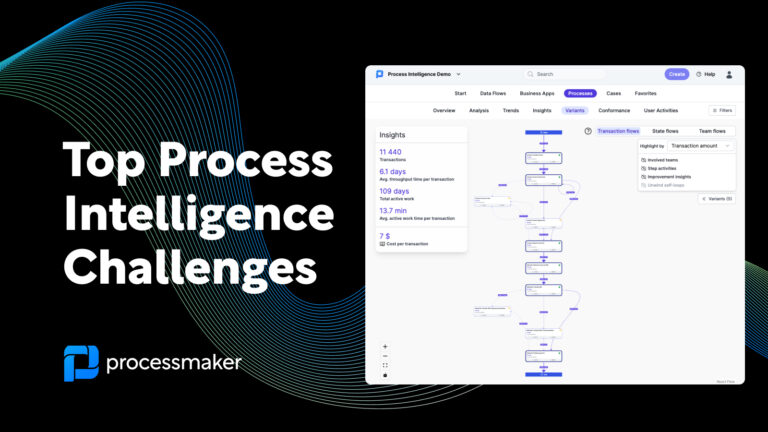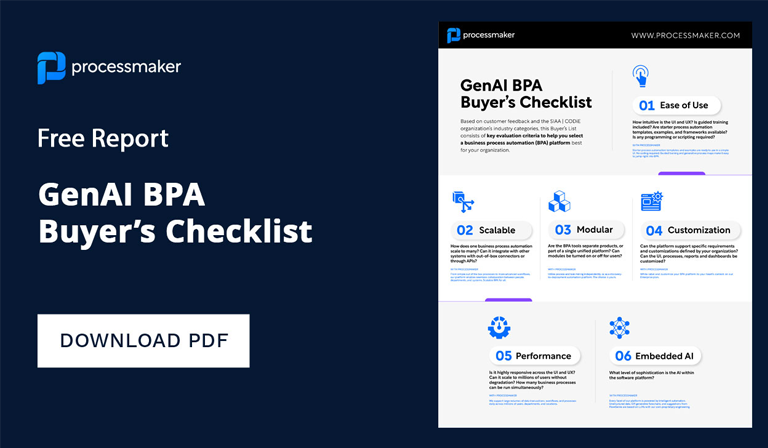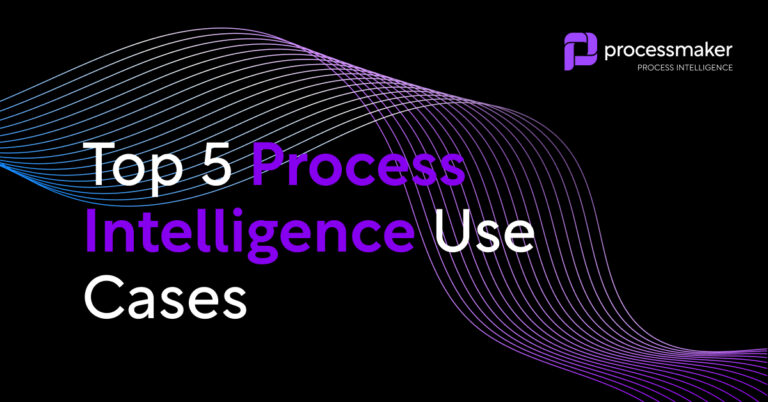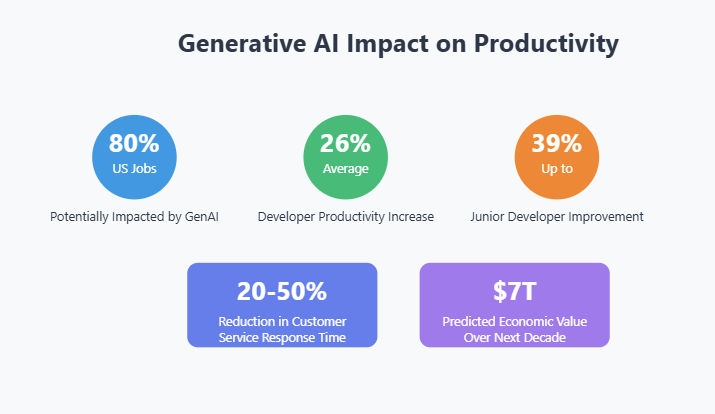Process intelligence (PI) has emerged as a game-changer in the automation era, offering businesses unprecedented insights into their processes. With its ability to uncover inefficiencies, streamline operations, and drive growth, it’s no wonder organizations are investing heavily in PI tools.
However, as with any innovation, implementing process intelligence may come with certain hurdles. From wrestling with data complexity to addressing security concerns, successful adoption can be a tricky road without the right software and expertise. But don’t worry—every challenge has a solution.
In this blog, we’ll explore what process intelligence is, how it works, the common challenges organizations face when engaging with process intelligence, and ways to overcome them so you can fully harness the power of PI.
What is Process Intelligence?
At its core, process intelligence is the art and science of analyzing and optimizing business processes. It provides a 360-degree view of how tasks and processes flow, pinpointing bottlenecks, delays, and inefficiencies.
Unlike traditional process mapping, PI is dynamic, data-driven, and automated—it doesn’t rely on static diagrams or gut feelings. Instead, it empowers organizations with actionable insights to make smarter decisions in real-time.
By visualizing every step of a process and measuring it against key metrics, businesses can understand precisely what’s working (and what’s not).

A screenshot of process with steps and variants: ProcessMaker’s Process Intelligence software
How Does Process Intelligence Work?
Process intelligence technology captures data from various systems that your business already uses—think CRMs, ERPs, HR tools, and more. For data collection to start, one needs to either install the software agent on their computer or install an extension on their browser.
Once the data is collected, it’s analyzed using advanced algorithms to create a visual representation of your workflows. This detailed map highlights inefficiencies and identifies opportunities for improvement, by providing tailored actionable recommendations.
Modern PI tools, like ProcessMaker, don’t stop at static records. They integrate seamlessly with your systems, feeding back real-time data and continuously updating insights so you can stay proactive. Flexible data capture methods, such as generative event logs, user interactions from a graphical user interface, and browser extensions, ensure accuracy and completeness for even the most complex processes.
But with all this potential comes some undeniable challenges. Here’s how to tackle them head-on.
Challenges Associated with PI (and How to Overcome Them)
1. Change Management
The Challenge:
Implementing unfamiliar software often sparks resistance. Employees may worry about adapting to new tools, fear disruption of routines, or be wary of installing an unfamiliar piece of software on their computers.
The Solution:
Change doesn’t have to be scary. ProcessMaker ensures smooth transitions with comprehensive documentation, content, and training resources. From onboarding tutorials to one-on-one support, employees are guided every step of the way. Any questions and concerns can be addressed by our customer success wizards before or during the rollout. This empowers your teams with the confidence and clarity they need to fully adopt the system. When people feel supported, they thrive—and so do your processes.
2. Data Quality
The Challenge:
Poor-quality or incomplete data can lead to inaccurate insights and flawed decisions. Many PI tools rely heavily on event logs, which are often sparse or unavailable, leaving gaps in analysis. This is especially true for nuanced software or legacy systems that do not produce event logs. Some PI tools may also use task mining technology to collect and analyze data, but since it requires recording user interfaces, sifting through extremely large amounts of data can be very difficult and may not result in the most accurate findings.
The Solution:
ProcessMaker’s PI tool redefines data collection. It gathers data from various sources, including graphical user interfaces and browser extensions like Chrome, making it accessible across devices and operating systems. By ensuring comprehensive data capture, ProcessMaker eliminates the limitations of traditional PI tools. This means that regardless of the complexity of your operations, you get meaningful insights every time.
3. Complexity of the Processes
The Challenge:
Many businesses face processes so intricate and multifaceted that even advanced tools struggle to map and analyze them accurately. This can occur in several scenarios:
- In larger teams and organizations.
- In very old, established processes that have been modified or changed many times over the years, becoming so complex and confusing that they are difficult to untangle.
- In niche industries that lack standard workflows.
- In processes and workflows with numerous variants, where the process can take different paths each time due to the many variables involved.
Some process intelligence (PI) tools focus on analyzing individual tasks—such as how long it takes to complete a specific task or process—while overlooking the bigger picture and getting stuck in the details of these complex processes.
The Solution:
ProcessMaker’s data capture and analysis methods ensure that factors like process complexity, duration, or other variables don’t impact the accuracy of the software’s results. A software agent installed on the user’s computer collects process, task, and business data directly from user interfaces, generating unified event logs. This eliminates discrepancies between data points, making the data ready for analysis using both process and task mining algorithms simultaneously to deliver operational insights. Data collection is guided by pre-defined rules set by the customer, so data is cleaned and sorted locally before being sent to the cloud.
ProcessMaker’s highly flexible data capture methods adapt to even the most sophisticated workflows without requiring manual intervention. Whether it’s a straightforward approval pipeline or a multi-departmental workflow with countless variables, the system delivers precise mapping and insights.
4. Scalability
The Challenge:
Organizations often struggle to scale PI solutions as their teams grow or processes expand, causing the technology to buckle under pressure.
The Solution:
ProcessMaker was built with scalability in mind. Whether you add more processes or expand operations across multiple departments, the platform adjusts seamlessly. With scalable implementation options, the learnings and best practices from pilot projects can be rolled out to the larger organization efficiently.
5. Security and Privacy
The Challenge:
One of the questions and concerns that come up before rolling out process intelligence initiatives is the question of privacy and security. This is totally understandable considering that many of the users are from sensitive industries and may have customer data that they need to be careful with.
The Solution:
Once you understand how ProcessMaker PI collects and analyzes data, any concerns will quickly disappear. High-standard protocols and safety models apply to both local software agents and the browser extension. You retain full control over what data is collected by selecting which applications should be included in the data collection. Data can also be gathered at a team level to ensure that individual data does not move to the platform. The data collection approach provided by PI is, therefore, inherently private and secure.
From the collected data, PI generates enriched event logs that are cleaned locally, which is more secure than sending raw data directly to the cloud—a method commonly used by other process discovery tools. Advanced privacy protocols ensure compliance with global standards, allowing businesses to use PI confidently and securely.
Unlocking the Full Potential of Process Intelligence
Process intelligence is a transformative technology that helps businesses to have complete transparency over their business operations and workflows, even the most complex ones. Despite the perceived challenges like change management, data quality, and scalability, advanced PI tools like ProcessMaker are able to overcome these challenges.
At ProcessMaker, we deliver advanced PI solutions designed to streamline workflows, provide actionable insights, and support growth—making technology work for you, not the other way around.





